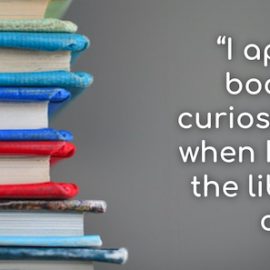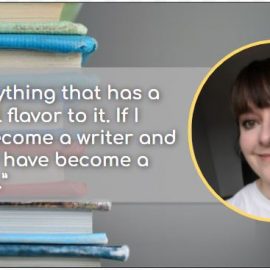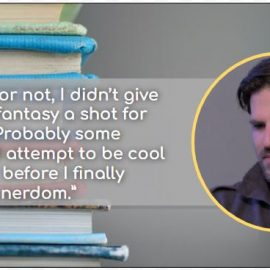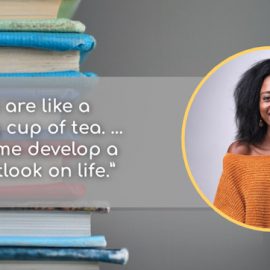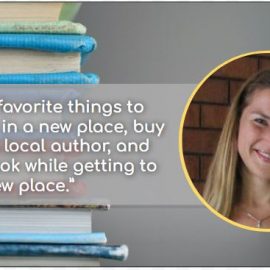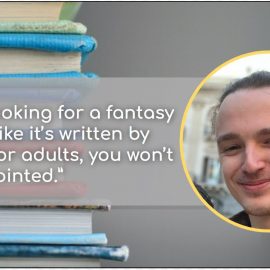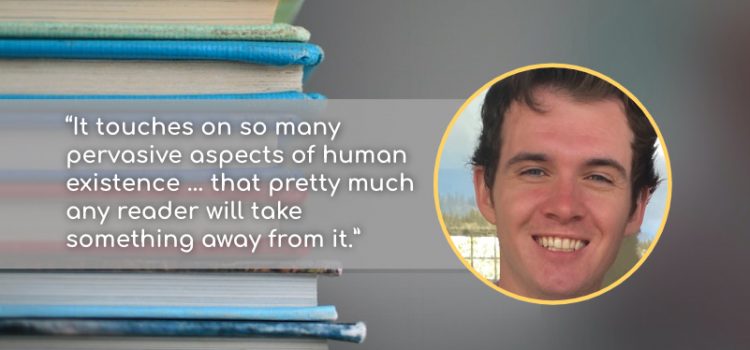
What novelist is also a philosopher? What’s the problem with most self-help books?
Conner could tell you. Based in Colorado, he’s a content writer at Shortform. We interviewed him recently to learn a bit about his relationship with books.
Our Interview With Conner
Conner doesn’t read books just for Shortform. Our interview with him lets us in on what he’s been reading and enjoying for years.
What’s your favorite book and why?
A painful question! If forced to choose, I’d say my favorite book is Pride and Prejudice by Jane Austen. It’s a masterpiece. First of all, the dialogue is sparkling and lively throughout. As a result, the main characters feel real and relatable. In fact, I’m pretty frequently reminded of actual friends of mine who exemplify some of the oddities of Austen’s characters in Pride and Prejudice. For example, consider Mr. Collins’s iconic proposal to Lizzy Bennett in chapter 19: “My reasons for marrying are, first, that I think it is a right thing for every clergyman in easy circumstances (like myself) to set the example of matrimony in his parish. Secondly, that I am convinced that it will add very greatly to my happiness; and thirdly … that it is the particular advice and recommendation of the very noble lady whom I have the honour of calling patroness.” How many of us know people who, like Mr. Collins, have no understanding of romance whatsoever? Although Mr. Collins is a bit of a caricature, I find traces of him in lots of people I know.
Beyond the excellent dialogue and lucid writing, Austen also does a great job examining the virtues that grounded Victorian social norms. Case in point: When Darcy decides not to dance at the first ball, he’s flouting traditional Victorian norms, and in doing so he’s portrayed as haughty and self-righteous. In other words, he’s portrayed as immoral. Through Darcy, Austen pierces into the ethics that ground social norms. In this respect, she’s just as much a philosopher as Kant, Nietzsche, or Hume.
What are you reading these days?
The most recent book I’ve read was, unsurprisingly, for Shortform. It was Just Mercy, which everyone should read. Besides Shortform work, though, next on my reading list is actually Through the Looking Glass. I’ve heard so much about it and Alice and Wonderland that I feel like I should read it.
What’s your favorite genre? Why does it intrigue you?
Within fiction specifically, I’d say that fantasy is my favorite genre. I’m a big Lord of the Rings fan, which I’m pretty sure is the pinnacle of fantasy. I’ve always found it fascinating that fantasy books can convey real, important truths through fantastical stories that, on the face of it, seem to have little to do with reality. For example, hobbits aren’t real—alas—but Frodo, Sam, Pippin, and Merry convey an important message: Those who seem underwhelming on the outside can be remarkable on the inside. Also, I think it’s easy for us to lose a sense of the fantastical elements in the actual world, and I think fantasy can help us see those real-world elements more clearly.
Are there any book genres or tropes that you dislike or refuse to read?
I generally don’t read books in the self-help genre. To clarify, this isn’t because I think it’s unimportant to try to better yourself. I definitely think the opposite! But my impression is that, pretty often, self-help books aren’t supported by empirical research—or, at best, are supported by cherrypicked research—and are more like assertions that well-known authors make, hoping nobody will call them out on it.
What’s your favorite way to read a book?
Ideally, somewhere in a hammock when the weather permits. Physical copies of books are, as far as I’m concerned, the objectively best way to read a book. I really can’t understand how people can prefer Kindles or audiobooks.
What book do you think everyone should read in their lifetime?
Another tough one. Personally, I think that The Brothers Karamazov is worth reading for just about everyone. It touches on so many pervasive aspects of human existence—like suffering, joy, and the relation of religion to both of those—that pretty much any reader will take something away from it. Plus, Alyosha—the main character—grows so much throughout the book, and it’s so gratifying to watch him become such a sympathetic protagonist by the book’s end.
Who are your favorite authors?
I’ll name three: Tolkien, Jane Austen, and a contemporary philosopher named Alvin Plantinga.
As far as beautiful prose alone is concerned, Tolkien might be unmatched in the English language. His ability to bring a scene from his imagination to life through words, always finding precisely the best word for every situation, is unbelievable. His sentences are ethereal but never fluffy. And, though he sometimes takes liberties and writes longer sentences than he needs to, it’s hard to fault him when he’s that good.
Jane Austen writes the most compelling dialogue of any author I’ve ever read. Because her dialogue is so dazzling, her characters feel like more than characters—like real people! Plus, she was unafraid to critique the reigning social norms of the day through her fiction, and I often find those implicit critiques compelling. Despite not being a philosopher in the technical sense, I’d say she’s effectively as good a philosopher as anyone.
As far as “actual” philosophers go, I’m a big fan of Alvin Plantinga, a contemporary philosopher of religion. First of all, he flouts the normal perception of philosophical writing as dry and impenetrable. On the contrary, his writing is lively and even contains the occasional joke—a rare novelty among philosophers. Plus, his arguments are deceivingly simple—deceiving because they concern subtle, nuanced topics that would appear to require complex arguments. Unlike most analytic philosophy, reading his work is engaging and—I might even say—exciting.
Was there a specific book that sparked your love of reading?
When I was in high school, reading To Kill a Mockingbird helped rekindle my love of reading because of its protagonist, Atticus Finch, who was so unequivocally good that I couldn’t help but root for him. I’ve found a few similarly compelling protagonists since then. Whenever I do, it’s impossible to put the book down. You can’t help but keep reading since you become so invested in them!
Do you have any guilty-pleasure books?
When I was in college, I did some reading tutoring at a local elementary school and, at one point, read Diary of a Wimpy Kid with my fifth-grade student. As ashamed as I am to admit it, the Diary of a Wimpy Kid books are hilarious—a lot of the juvenile humor resonates with my inner immature child, I suppose.
Have any books you’ve read caused you to make any life changes or to develop any habits?
It’s not technically a book, but an essay by Peter Singer called “Famine, Affluence, and Morality” lingers in my mind whenever I spend money unnecessarily. Basically, Singer argues that, because each dollar you spend unnecessarily could instead be donated to fight poverty, resulting in, say, a child not going hungry for a month, you’re obligated to donate all of your excess money. I’m not sure what to do with those arguments, but I definitely find them hard to refute. It sure seems like, when faced with the choice of whether to enjoy a milkshake or feed a starving child, you should do the latter. So, hopefully, in the future, I’ll be able to take those arguments to heart a bit more and donate more.
What’s your favorite quote from a book or an author?
To steal from Gandalf—and therefore from Tolkien: “I will not say: do not weep; for not all tears are an evil.”
What are your favorite book adaptations and why?
At the risk of being unoriginal, it’s hard not to pick the three Lord of the Rings movies. I mean, Return of the King alone won 11 Oscars! I love those movies for quite a few reasons. First, I’d say they stay reasonably true to the book. Peter Jackson, the director, didn’t take as many liberties as directors of adaptations are known to do. Second, the movies captured the grandeur of Frodo’s journey so well; the New Zealand landscapes are absolutely striking. Third, and most importantly, the characters were so well done. Seriously, Ian McKellen’s Gandalf is just flawless, and the actors playing Legolas, Gimli, and Aragorn all bring the book’s characters to life.
Are there any books you had to read for Shortform that you thought you wouldn’t like and ended up loving?
I just read False Alarm, which is a book on climate change. I came in with low expectations. Partially because I expected it to be a pseudoscientific dismissal of climate change and partially because—as someone who prefers the humanities—I thought a science book would be boring. But, I actually found it really interesting. Lomborg—the author—is a really excellent writer, which kept me engaged, and he also thoroughly cites all of the studies that he uses to support his arguments. Plus, in doing the research and fact-checking, I learned a lot about climate change that I was totally unfamiliar with before.
Conner’s Favorite Reading
- Pride and Prejudice by Jane Austen
- The Lord of the Rings by J. R. R. Tolkien
- The Brothers Karamazov by Fyodor Dostoevsky
About the Series
At Shortform, we want to give our employees names and faces so you can get to know the people who make the magic happen. That’s why we’re doing the Shortform Reads series, where we interview our employees and share their thoughts and opinions. You can check out more employee interviews here.

